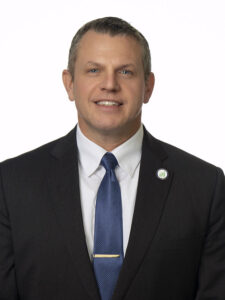
Jason E. Glass
Back in December, I wrote a column about what I considered to be deeper learning, a topic that you probably hear educators discuss a lot these days. While we have avoided laying out an official definition from the Kentucky Department of Education so that those learning and working in our schools can help determine what it means, we do know that deeper learning can take several forms.
Broadly, deeper learning experiences go beyond memorization or learning to do a repetitive task and require us to demonstrate a higher-level set of skills. These might include thinking through something complex with many moving parts, or it might require a creative solution where there is no clear right answer, or it might require effectively communicating or influencing others through written, oral or visual means. Deeper learning certainly touches on and requires “core” content knowledge such as reading, writing, mathematics, science or social studies – but it also means that we go beyond just the basics and use that knowledge to solve a real problem or create something new and important.
Kentucky is the only state involved in a group called The Deeper Learning Dozen, which is made up of school districts across the U.S. and Canada that have been meeting for the past four years to discuss vibrant learning experiences. In January, The Deeper Learning Dozen held a meeting at High Tech High, a pioneer in the large-scale use of project- and problem-based learning. You may remember it as the school featured in the film, “Most Likely To Succeed.”
As I wandered through the halls and saw examples of rich and deep learning experiences, one thought kept coming back to my mind. While the learning we saw was impressive, none of the things being done in those classrooms were things that we can’t do – or aren’t already doing – right here in Kentucky. We already have tremendous examples across the Commonwealth of innovative and rich learning experiences happening in classrooms.
In eastern Kentucky, Rowan County Schools has implemented project-based learning across all grade levels. Project-based learning gives students the opportunity to master content through investigating a complex topic or question. At Tilden Hogge Elementary School, teacher Mollie Clark’s 1st-grade class learned about water conservation and the environment at Cave Run Lake, which included a field trip through the Morehead fish hatcheries. They investigated local wildlife and learned about the roles and responsibilities of those in the preservation field.
At Dunn Elementary School in Jefferson County, 4th-grade students spent the first part of this school year exploring native animals and plants in the Commonwealth. Assistant Principal Kim Slusher said the skill development she’s seen among the students is one of the biggest benefits of project-based learning.
“They’ve done their own research. They’ve incorporated writing articles into the unit,” she said. “Throughout this unit, they became those biologists.”
One of the biggest benefits I see of project-based learning and deeper learning is not only do students find it more engaging, but it also mimics how we learn in real life.
When an adult is posed with a question or a problem, seldom do we rely on a set of skills we learned in just one class, such as mathematics or social studies. We combine our skills in reading to research the subject and possible solutions. We use our soft skills to work together with our colleagues to implement a solution. We use our knowledge of history to learn from what has happened in the past and we use the skills we learned in sociology and psychology to figure out how people are likely to react to our solutions.
This kind of deeper learning is one of the three big ideas behind United We Learn, Kentuckians’ vision for the future of education in the Commonwealth. These kinds of vibrant student experiences spark curiosity, motivation and engagement, while cultivating enthusiasm for lifelong learning.
As family members of students, it sometimes can be hard to understand what is happening in the classroom. Our ideas of what classrooms should look like is shaped by the classrooms we experienced as children, many of which had the traditional desks in rows with a teacher in the front of the room lecturing. While this kind of “direct instruction” has its place, it does not support our students in having the kinds of deeper learning experiences that truly prepare them for the complex, globally interconnected and fast-moving future ahead.
If you don’t understand what is happening in your student’s classroom, you can talk with your student about their experiences at school and also reach out and ask their teachers about what the students are working on. Engage with the teachers and ask what skills your child is learning and how you can help support that instruction at home. As a former social studies teacher, I can guarantee you that our teachers are always willing to engage with families about the instruction being offered in the classroom.
Our shift to deeper learning in Kentucky already has begun and I’m excited to see how our teachers find new ways to help their students engage deeply with the content they are learning.




Leave A Comment